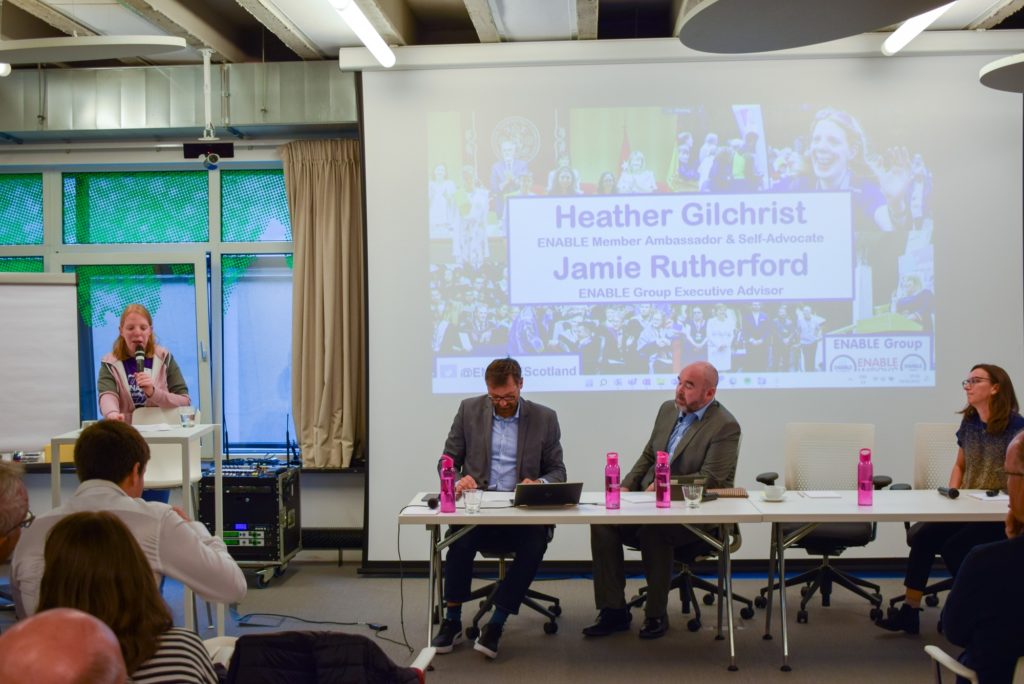Heather Gilchrist is a membership ambassador and self-advocate from ENABLE Scotland. Heather spoke during our conference in September. This is Heather’s speech:

Heather Gilchrist speaking at Europe in Action
At the conference this week, I have heard some upsetting stories about people who have a learning disability having to live in institutions.
But I have also heard some inspiring stories about people and organisations across Europe campaigning and acting to end segregation.
Today, I am going to talk a little bit
Scotland: History of placing people into residential institution
Like many countries, Scotland had a policy of placing virtually everyone who had a learning disability in residential institutions.
This horrible looking building was Lennox Castle Hospital, which was about 20 kilometres north of Glasgow.
Up to 1,500 people with learning disabilities lived at Lennox Castle at the same time.
The youngest residents were only 10 years old, and the oldest were over 80.

Lennox Castle
Families determined this would not happen to their children
A lot of people who had a learning disability did not want to leave their family and their community to live in institutions like Lennox Castle, and a lot of parents were determined that this would not happen to their children.
In 1954, five of those families met in Glasgow to set up a new charity which would campaign for their children – and everyone in Scotland who had a learning disability – to have the right and the support to live in their own community.
They wanted people who have a learning disability to have an equal chance to live a good life independently in the community. This was quite revolutionary at the time.
Over the years, ENABLE would develop from parents and family members speaking on behalf of people who have a learning disability, to become a vibrant, member-led self-advocacy network.
ACE groups – which stands for Active Communities of Empowered people – were established right across Scotland to lead ENABLE’s campaigning.
My Own Front Door
In 2000, the Scottish Government committed to end institutionalisation, and Lennox Castle closed in 2002.
However, despite this, ENABLE still heard stories of people being forced to live in hospitals and institutions because health and social work authorities weren’t able to put the right support in place for them to live in the community.
ENABLE campaigned for the Government to act, and in 2018, the Scottish Government published a report call “Coming Home” which identified that at least 700 people from Scotland were in inappropriate institutional placements a long way from home. In fact, 79 of those people had actually been moved to institutions outside Scotland.
The report called for urgent action, but more than 3 years later, nothing had happened.
In fact, ENABLE researched the figures published by individual health boards around Scotland and found that there were now more than 1,000 people in placements far from home, including 294 adults with learning disabilities or autism living in hospital wards.
So at the start of this year, ENABLE launched a new campaign called “My Own Front Door”.
Led by our self-advocates from ACE, the campaign urged the Scottish Government to finally uphold everyone’s human right to live in a home of their choice in a community they choose close to the people they love.
We made a video, which I would like to show you now.
The good news is that the Scottish Government responded to our campaign by promising to end new institutional placements by March 2024, and to ensure people who have a learning disability are only in residential units when – and for as long as – they require assessment and treatment.
They also committed to work with local authorities, health boards and providers to bring the people still in hospitals and institutions back to the communities where they want to live.
Read more:
- Living freely and being members of communities like everyone else – László Bercse
- “Now I support others to get out of institutions”
- “Live a life of your own, get education and experience, get a job with proper money”
- “No institution can replace a proper family”
- “It didn’t take long before I knew that I wanted to leave the institution”
- End segregation campaign





